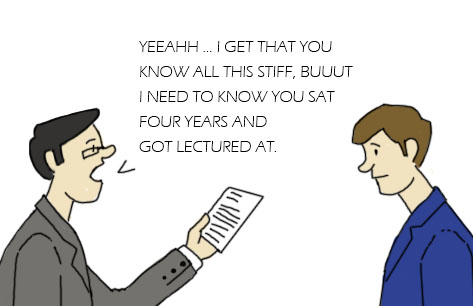Would you allow someone without a college degree to perform your major brain surgery?
Consider this: the only skills in the brain surgery career path currently unlearnable outside the academic space are sensitivity to death and real practice on cadavers. Both are necessities, as intimate neurosurgical knowledge gained only from afar would be unemployable (both skillfully and professionally) without them. However, as inaccessible as these experiences are now, they easily could be made available outside the scholastic paradigm.
Two and a half millenniums after the first academy, a university degree is more than ever just a stamp. A very impractical stamp and one simultaneously under- and overvalued. Another Orionite detailed the underlying symbolism of a GPA and her analysis applies equivalently to the degree itself. The reason is that today, everything learned in an expensive classroom can be learned outside of one. Easier.
The undergraduate degree is the high school diploma of twenty years ago, and the master’s or doctorate is the new baccalaureate. This credential inflation is only getting worse: college payoff is shrinking. This doesn’t mean, however, that those without degrees and those that spent the $50k plus on a degree are in the same playing field. It means that those without degrees are massively penalized into low pay and generally shitty jobs, while a lot of blooming adults are going to get stuck into unworthy occupations after graduation anyway. College isn’t about excelling anymore, it’s about survival, and this is only reinforced by steadfast but poorly reasoned views about hiring.
Getting a degree is a stamp that says you participated in the established educational conduct. Wisdom, implementation and experience can all be achieved elsewhere. The worst misuse of this stamp is when administrations arbitrarily select it as their sole judgment of criterion, namely, other teaching facilities.
To teach at a university one needs to have majored in their selected teaching subject, or complete a qualifying waiver. The problem is that field experience should inform a college’s teaching methodology, not the same archaic patterns ad nauseam, with only minimal curriculum changes every five or so years. Studying a subject with the sole intention of teaching completely defeats the practical purpose of learning. Students of martial arts aren’t being taught concentration, strength, elasticity and balance just so they may pass the gymnastic virtues swiftly on to the next guy; they learn for the value of the lessons themselves. This is particularly crucial for pathways like history, philosophy, and many subdivisions in political science, where often the only outlook on a career involves teaching. An exception is criminal justice, where often members of the police force or legal sector retire their original careers and settle into teaching positions. Field experience informs curriculum.
I think a lot of people go to college not because they have a precise vision of what they want to accomplish, but because they don’t know what to do after high school. The spirit of entrepreneurialism is squandered by indetermination and fear, and college enrollment benefits thus. Adding to that, past generations want to spookify the idea of finding jobs without an education, when really, that education can be cheaply and efficiently managed through self-discipline. It just takes a more liberal outlook from employers about where they want their employees’ education to come from: sitting in class at a lecture, or sitting at home on the internet, or traveling and picking up new skills manually.
The internet is in its infancy. One day there may be as many surgery tutorials available as there are clown porn videos. We ditched the idea of stamps when email was invented – it’s time to do it again.
William Rein can be reached at [email protected] or @toeshd on Twitter.









